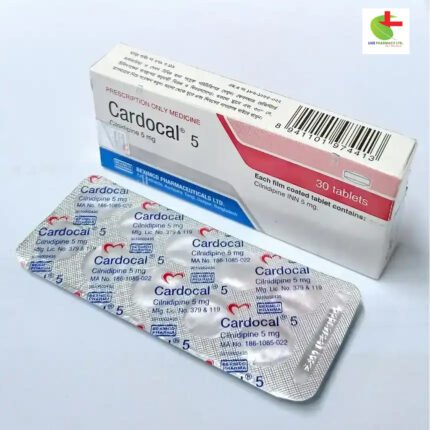Cardocal 10
90.00৳ Strip
- Cardocal is a trusted medication prescribed for hypertension management, aimed at safeguarding vital organs like the heart and kidneys.
- Particularly beneficial for elderly patients, individuals with diabetes, and those with chronic kidney disease.
- Works by relaxing blood vessels to reduce high blood pressure, administered in convenient once-daily doses.
- Inhibits calcium channels to promote vasodilation and regulate heart rate.
- Carefully considers interactions and contraindications to ensure effective treatment and patient safety.
 Brand
Brand
|
Beximco Pharmaceuticals Ltd |
|---|---|
 Generics
Generics
|
Cilnidipine |
 Type
Type
|
Tablet |
Indications
Cardocal is indicated for managing hypertension to protect vital organs. It is particularly beneficial for elderly patients, individuals with diabetes, and those with albuminuria. The use of Cardocal has also expanded in patients with chronic kidney disease.
Understanding Hypertension
Hypertension refers to elevated blood pressure, where the force exerted by blood against the blood vessel walls is too high. This condition can lead to damage within the blood vessels over time.
Pharmacology
Cilnidipine, a dihydropyridine calcium-channel blocker, works by binding to L-type voltage-dependent calcium channels in vascular smooth muscle cells. This action inhibits calcium influx, leading to muscle relaxation and vasodilation. It also inhibits N-type calcium channels in sympathetic nerve cells, which reduces the release of norepinephrine and helps control heart rate after blood pressure reduction.
Dosage & Administration
For adults, the typical dose of Cardocal is 5-10 mg once daily after breakfast, with a maximum of 20 mg daily.
Special Populations
Pediatric use of Cilnidipine has not been established, and caution is advised for elderly patients due to potential increased susceptibility to hypotension.
Interactions
Cardocal may interact with other antihypertensive medications, antipsychotics causing hypotension, and drugs like quinidine, carbamazepine, phenytoin, rifampicin, cimetidine, and erythromycin.
Contraindications
Cilnidipine should not be used in patients with known sensitivity to the drug or any of its components, those with cardiogenic shock, recent myocardial infarction, acute unstable angina, or severe aortic stenosis.
Side Effects
Common side effects of Cardocal include dizziness, flushing, headache, hypotension, peripheral edema, palpitations, gastrointestinal disturbances, increased urination frequency, lethargy, eye pain, and depression.
Pregnancy & Lactation
Cilnidipine is contraindicated during pregnancy and breastfeeding, unless absolutely necessary, and lactation should be discontinued if the drug is administered.
Precautions & Warnings
Special care is advised when administering Cardocal to patients with severe liver dysfunction or a history of serious adverse reactions to calcium antagonists. Gradual dosage reduction is recommended when discontinuing treatment.
Therapeutic Class
Cardocal belongs to the class of calcium-channel blockers, used to manage hypertension effectively.
Storage Conditions
Store Cardocal below 30°C, protected from light and moisture, and keep it out of reach of children.













Reviews
There are no reviews yet.